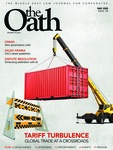Qatar track for PPP legislative framework
According to the Gulf Times, various stakeholders in the state are currently finalising a legislative framework for public-private partnership (PPP) models in Qatar, a move that would further develop country’s economy, Qatar Financial Centre (QFC) Authority CEO Yousuf Mohamed al-Jaida has said.
Speaking at the panel discussion on ‘Qatar’s Reaction to the New Macroeconomic Headwinds’ during Euromoney Qatar Conference last month, al-Jaida noted that the country needs a regulatory framework to enable PPP models.
“Back in the 1990s, when Qatar built its LNG industry, there was no clear regulatory framework for PPPs in the country…Qatar’s economy was built on a PPP model and it was a very successful model, and I think other sectors need to replicate that success.
“What is currently needed for Qatar is a regulatory framework to enable PPPs and that’s probably an area that’s being developed currently by various stakeholders in the state. But I think once the framework is available, that success can definitely show in various other sectors and will be one of the areas that will be focused on for the next phase of development,” he said.
Al-Jaida said Qatar’s entire LNG industry was built on a PPP model, adding that many GCC countries are looking into PPPs to diversify their economies.
“The country has built a successful model of partnership between the public and private sectors. The local industries have greatly developed throughout the past year and have benefited from partnerships with international companies,” he said.
Al-Jaida added, “Whether it’s infrastructure or stadiums, a PPP structure is probably going to be the most successful model. A lot of economies regionally and globally have built their infrastructure based on a PPP model.”
Asked about the role of Islamic finance in diversifying the economy, al-Jaida said, “The Islamic banking industry will greatly benefit from the diversification of the local economy. There is still a gap of under penetration for Islamic banking that must be addressed. As the economy moves away from its dependence on hydrocarbon revenues, Islamic Finance will have a bigger role to play and innovation will be critical for this growth.”
On the advantages provided by the QFC, al-Jaida said the QFC brings a “unique business model” that allows for further integration with the economy by giving local companies the opportunity to grow both in Qatar and beyond.
He said the regulatory infrastructure at the QFC is based on international best practices and it is further reinforced by the presence of the Qatar International Court and Dispute Resolution Centre (QICDRC), based on English common law, which has recently enforced a judgment in a case between a QFC firm and a non-QFC firm.
“This judgment acts as a reassurance for people doing business in Qatar and the region and is an important development that reiterates the QFC’s strong and transparent legal environment,” he said.

























































































































